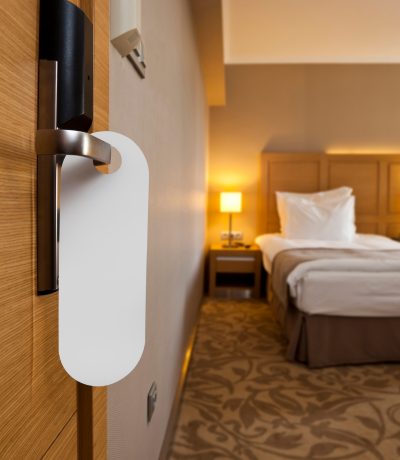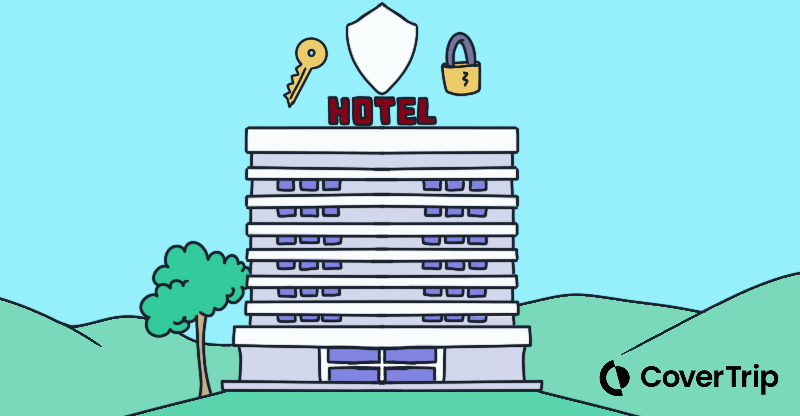Hotel Safety Tips All Travelers Must Know
12 May 2023
Don’t want to be hysterical here, but there are specific personal safety risks that come with staying at a hotel or Airbnb.
Did you hear about the TikTok traveler who heard a stranger in her hotel room (video) when she was in the shower? Warning: Part 2 is scarier.
One commenter, who works in the industry, was spot-on in identifying the intruder as an employee. In the end, it was a maintenance employee but still, terrifying.
When deciding on a hotel, the natural approach is to search based on price and location. To avoid a hotel room safety issue, however, it’s essential to look a little more carefully and have a strategy.
This article will help you with practical steps to protect yourself while staying away from home.

Choose a hotel with safety in mind
You can get a good idea of what the neighborhood is like by looking at the satellite and street views on Google Maps. What exactly are you looking for?
- bars on windows
- security fences
- boarded up properties
- basically anything you wouldn’t want to see where you live
If you plan to ride-share in and away from the hotel, you want the surrounding grounds (think the pool or garden, for example) to be safe too.
The most helpful way to find out about the hotel’s safety and surrounding area is by reading reviews, but not all hotels are open to posting negative reviews on their site. Do a little quick searching using your favorite browser and see what you can find out. If past travelers complained of noise or an unwelcome neighborhood, move along.
At a minimum, any hotel you stay at should have these security measures in place:
- 24-hour staffed lobby
- Security cameras in public areas
- Digital room keys or other key technology
- A well-lit exterior
- Gated and locked rear/side entrances
These details should be readily available on the hotel website. Can’t find it? Give the front desk a call.
If they’re hesitant to answer your questions or seem confused, that’s a negative strike and you may want to look elsewhere.
Check in during daylight
If possible, try to arrive at the hotel during the daytime. This will allow you to get familiar with the surroundings and ensure that the area is safe before checking in.
You already know not to disclose your room number, as do most hotel staff. In addition, don’t disclose specifics about your daily plans so that potential lurkers hear when your room will be unoccupied. Basically, be discrete.
Ask the hotel staff for a room on floors three to five. This is the sweet spot.
- Rooms on the ground and second floors are the most easy targets of crime because they are the easiest to get into and out of.
- Rooms above the fifth floor are harder to escape in case of a fire emergency (too many smoke-filled stairways to climb down).
Finally, ask for a room closer to emergency exits, stairwells, and elevators. If the room you want has a balcony, find out if there is sufficient outdoor lighting.
In addition, after getting a key for yourself and each person you’re staying with, tell the front desk that no one else should receive a key.
Some criminals have been known to convince hotel staff to give them a ‘replacement’ key by saying they’re staying with you – especially if they learn your name. You want to prevent that from happening.
Check the room upon entering
Once you arrive at your room, check the surroundings before entering. Make sure the hallway is clear and the door appears to be fully locked.
Once inside the room, do a full safety sweep, including:
- Block the door open with your heaviest suitcase, leaving room for you to walk through. This is so you can escape if you discover someone hiding in the room.
- Walk around the room, looking inside the shower, closets (grab a hanger from the first closet), wardrobe, and under the bed for stowaways – it does happen!
- Use the hanger to prod the curtains and make sure no one is hiding behind. (If they react by trying to grab you, they’ll get a fist of hanger instead while you escape.)
- Check that all windows are, or can be, securely locked.
- Check the deadbolt on the door to be sure the lock is working properly.
- Lock your door and always use the deadbolt and/or the chain lock.
- Pull out your portable door lock and secure the door completely from intruders. The $9 GDFOX portable door lock is my favorite: it’s small and easy to use.
- Put your portable alarmed foot stop in the door. (If you’re a heavy sleeper, this $14 device sounds an alarm if someone tries to open the door.)
Finally, examine the room key sleeve to see if it has your room number on it. If so, toss it in the trash.
When you leave your room
To make your room look occupied when you leave:
- Hang the ‘do not disturb’ sign on the door,
- Leave a light or two on,
- Leave the TV on (sound low), and
- Close the curtains (so no one can see inside)
If you really want the room cleaned, or want fresh towels, make sure you secure your valuables. The only trustworthy way to do this is to take them with you. The hotel staff can always open the in-room safe (how do you think people who forget their password recover their stuff?). And take your travel itinerary, which can indicate to someone with nefarious intentions when your room is empty.
If you want fresh towels, ask for them at the front desk.
Related topics
Damian Tysdal is the founder of CoverTrip, and is a licensed agent for travel insurance (MA 1883287). He believes travel insurance should be easier to understand, and started the first travel insurance blog in 2006.
